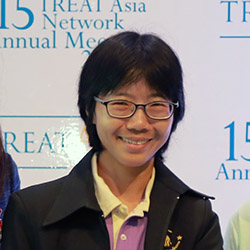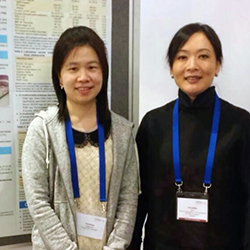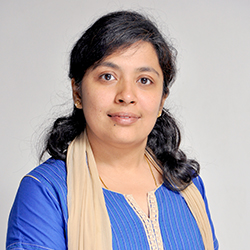 Dr. Linda Aurpibul
Dr. Linda AurpibulStudies conducted by researchers in the TREAT Asia Network were featured prominently at the 2016 Conference on Retroviruses and Opportunistic Infections (CROI), held February 22-25 in Boston. CROI is an annual international forum for leading scientists in the field of HIV/AIDS and related conditions. “I am pleased that we had the opportunity to share results from TREAT Asia studies at CROI,” said TREAT Asia Director Dr. Annette Sohn. “They were focused on treatment outcomes of children and adolescents in the region, and emphasized the importance of ongoing research funding for this vulnerable group.”
Dr. Linda Aurpibul of Chiang Mai University in Thailand led a study that found a significant rate of hepatitis B (HBV) coinfection in HIV-positive children and adolescents from Vietnam, Thailand, Cambodia, Malaysia, Indonesia, and India. Many patients who had been vaccinated against HBV were found to have insufficient protective antibody. The authors recommend HBV screening of HIV-infected children to guide use of ART with anti-HBV activity and to facilitate revaccination of those with insufficient protection.
 Dr. Tavitiya Sudjaritruk and Dr. Annette SohnAnother study, led by Chiang Mai University investigator Dr. Tavitiya Sudjaritruk, examined perinatally HIV-infected Asian adolescents whose viral loads had increased after they were previously suppressed to undetectable levels. The authors found that post-suppression virologic rebound was not uncommon. Adolescents with wasting, being cared for by grandparents, using PI-based regimens, commencing ART after 2005, or having pre-adolescence virologic failure were at higher risk of rebound. The authors suggest that these patients may benefit from increased monitoring to support long-term treatment success.
Dr. Tavitiya Sudjaritruk and Dr. Annette SohnAnother study, led by Chiang Mai University investigator Dr. Tavitiya Sudjaritruk, examined perinatally HIV-infected Asian adolescents whose viral loads had increased after they were previously suppressed to undetectable levels. The authors found that post-suppression virologic rebound was not uncommon. Adolescents with wasting, being cared for by grandparents, using PI-based regimens, commencing ART after 2005, or having pre-adolescence virologic failure were at higher risk of rebound. The authors suggest that these patients may benefit from increased monitoring to support long-term treatment success.
Use of the drug cotrimoxazole, which prevents pneumocystis pneumonia, was found to also improve the growth rate of HIV-infected children in the TREAT Asia network. This study was led by Dr. David Boettiger of The Kirby Institute, Sydney, Australia. The authors suggested that cotrimoxazole may complement ART and nutritional intervention programs for Asian children entering into HIV care programs.
 Dr. David Boettiger
Dr. David BoettigerSeveral additional presentations at CROI used data from the International Epidemiologic Databases to Evaluate AIDS (IeDEA). TREAT Asia has managed the Asia/Pacific section of IeDEA since 2006. Dr. Eliane Rohner of the University of Bern, Switzerland, presented three of these studies, all of which analyzed the risks of HIV-associated cancers. In one analysis, HIV-positive women in Southern Africa and Latin America were found to have a much higher risk of invasive cervical cancer than women from North America and Europe. Other analyses found that women in Southern Africa had a higher risk of the cancer Kaposi’s Sarcoma than women in Europe, and that HIV-positive children of sub-Saharan African origin, whether they live in Africa or Europe, had higher risks of this cancer, while no cases were observed among HIV-positive children in Asia.
 Dr. Vidya MaveAnother study was presented by researchers from the BJ Medical College-Johns Hopkins University program that is collaborating with TREAT Asia and IeDEA. Dr. Vidya Mave’s analysis showed that drug interactions can complicate treatment for HIV/TB co-infected patients at their center in Pune, India. The study found a high rate of tuberculosis, and a high risk of dying from the infection, in HIV-positive patients on second-line antiretroviral therapy, which was associated with the use of the protease inhibitors (PIs), which have drug interactions with the tuberculosis medicine rifampin. To avoid the risk of this interaction increasing failure of tuberculosis treatment, the researchers emphasized that tuberculosis prevention efforts should be increased to reduce the need for using these medicines simultaneously.
Dr. Vidya MaveAnother study was presented by researchers from the BJ Medical College-Johns Hopkins University program that is collaborating with TREAT Asia and IeDEA. Dr. Vidya Mave’s analysis showed that drug interactions can complicate treatment for HIV/TB co-infected patients at their center in Pune, India. The study found a high rate of tuberculosis, and a high risk of dying from the infection, in HIV-positive patients on second-line antiretroviral therapy, which was associated with the use of the protease inhibitors (PIs), which have drug interactions with the tuberculosis medicine rifampin. To avoid the risk of this interaction increasing failure of tuberculosis treatment, the researchers emphasized that tuberculosis prevention efforts should be increased to reduce the need for using these medicines simultaneously.